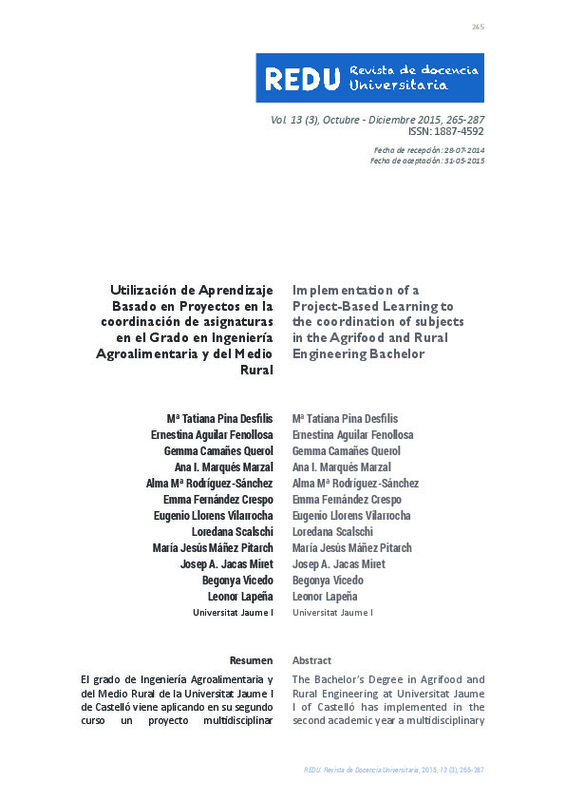Akınoğlu, O. and Tandoğan, R. O. (2007). The effects of problema-based active learning in science education on student ́s acadèmic achivement, attitude and concept learning. Eurasia Journal of Mathematics, Science & Technology Education, 3, 1, pp. 71-81.
Branda, L. A. (2009). L'aprenentatge basat en problemes, en AA.VV. L'aprenentatge basat en problemes, Cerdanyola del Vallès: IDES-UAB.
Belbin, R. M. (1981). Management Teams: Why They Succeed or Fail, Oxford, UK: Butterworth-Heinemann.
[+]
Akınoğlu, O. and Tandoğan, R. O. (2007). The effects of problema-based active learning in science education on student ́s acadèmic achivement, attitude and concept learning. Eurasia Journal of Mathematics, Science & Technology Education, 3, 1, pp. 71-81.
Branda, L. A. (2009). L'aprenentatge basat en problemes, en AA.VV. L'aprenentatge basat en problemes, Cerdanyola del Vallès: IDES-UAB.
Belbin, R. M. (1981). Management Teams: Why They Succeed or Fail, Oxford, UK: Butterworth-Heinemann.
Blank, W. (1997). Authentic instruction. In W.E. Blank & S. Harwell (Eds.), Promising practices for connecting high school to the real world, pp. 15-21. Tampa, FL: University of South Florida. (ERIC Document Reproduction Service No. ED407586).
Bouhuijs, P. A. J. (2011). Implementing Problem Based Learning: Why is it so hard? REDU - Revista de Docencia Universitaria, 9, 1, pp. 17-24.
Buckley, F. J. (1998). Team Teaching: What, Why, and How? Thousand Oaks, CA, Sage.
Buela-Casal, G. and Sierra, J. C. (2007). Criterios, indicadores y estándares para la acreditación de Profesores Titulares y Catedráticos de Universidad. Psicothema, 19, pp. 357-369
Dickinson, K. P., Soukamneuth, S., Yu, H. C., Kimball, M., D'Amico, R., Perry, R., etal.(1998). Providing educational services in the Summer Youth Employment and Training Program (Technical assistance guide). Washington, DC: U.S. Department of Labor, Office of Policy & Research. (ERIC Document Reproduction Service No. ED420756)
Esteban-Guitart, M. (2009). Un estudio empírico sobre las ventajas e inconvenientes del Aprendizaje Basado en Problemas (ABP) en grupos numerosos. Aprender. Caderno de Filosofia e Psicologia da educaçao, 7, pp. 131-145.
Esteban-Guitart, M. (2011). Del "Aprendizaje Basado En Problemas" (ABP) al "Aprendizaje Basado En La Acción" (ABA). Claves para su complementariedad e implementación. Revista de Docencia Universitaria, 9, 1, pp. 91-107.
Harwell, S. (1997). Project-based learning. In W.E. Blank & S. Harwell (Eds.), Promising practices for connecting high school to the real world (pp. 23-28). Tampa, FL: University of South Florida. (ERIC Document Reproduction Service No. ED407586).
Hersey, P., Blanchard, K. H. and Johnson D. E. (2001). Management of Organizational Behavior: Leading Human Resources. (8th ed). New Jersey: Prentice-Hall, Inc.
Ivins, J. R. (1997). Interdisciplinary project work: practice makes perfect? EEE Transactions on Education, 40 (3) pp. 179-183.
Jones, C. (2009). Interdisciplinary Approach - Advantages, Disadvantages, and the Future Benefits of Interdisciplinary Studies, ESSAI: Vol. 7, Article 26. Available at: http://dc.cod.edu/essai/vol7/iss1/26.
Kjersdam, F. and Enemark, S. (1994). The Aalborg experiment, project innovation in university education. Aalborg: The University of Aalborg Press.
Kozlowski, S. W. J. and Ilgen, D. R. (2006). Enhancing the efectiveness of work groups and teams. Psychological Science in the Public Interest, 7(3), 77-124.
László, E. (2004). Tú puedes cambiar el mundo: manual del ciudadano global para lograr un mundo sostenible y sin violencia. Budapest: Ediciones Nowtilus.
Llorens, E. & Lapeña, L. (2014). Application of Google Drive software as a resource for teamwork. Proccedings of XVII International Congress EDUTEC (In press).
Maynard, M. T., Mathieu, J. E., Rapp, T. L. and Gilson, L. L. (2012). Something(s) old and something(s) new: Modeling drivers of global virtual team effectiveness. Journal of Organizational Behavior, 33,342-365.
Moursund, D., Bielefeldt, T. and Underwood, S. (1997). Foundations for The Road Ahead: Project-based learning and information technologies. Washington, DC: National foundation for the Improvement of Education. Available at: http://www.iste.org/research/roadahead/pbl.html.
Nunes de Oliveira, J.M. (2011). Nine tears of Project-Based Learning in Engineering. REDU - Revista de Docencia Universitaria, 9(1). Número monográfico, especial dedicado al Aprendizaje basado en Problemas. Recuperado el 28 de julio de 2014 en http://red-u.net/redu/files/journals/1/articles/192/public/192-198-2-PB.pdf.
Oakley, B. (2004). Coping with Hitchhikers and Couch Potatoes on Teams. Journal of Student Centered Learning, 2, 1, pp. 32-34.
Parker, G. M. (2008). Team players and teamwork: New strategies for developing successful collaboration. John Wiley & Sons.
Rosenfield, P. L. (1992). The potential of transdisciplinary research for sustaining and extending linkages between the health and social sciences. Social science & medicine, 35(11), 1343-1357.
Rué, J., Font, A., Cebrián, G. (2011). El ABP, un enfoque estratégico para la formación en educación superior. Aportaciones de un análisis de la formación en derecho. REDU - Revista de Docencia Universitaria, 9, 1, pp. 25-44.
Sáez de Cámara Oleaga, E., Guisasola Aranzabal, J., Garmendia Mujika, M. (2013). Implementación y resultados obtenidos en una propuesta de Aprendizaje Basado en Problemas en el Grado en Ingeniería Ambiental. REDU - Revista de Docencia Universitaria, 11, pp. 85-112.
Valero, M., Navarro, J. (2009). La planificación del trabajo del estudiante y el desarrollo de su autonomía en el aprendizaje basado en proyectos en SEVILL A, J (coord.). La metodología del aprendizaje basado en problemas. Universidad de Murcia: Murcia.
Velez de C. A. (1998). Aprendizaje basado en proyectos colaborativos en la educaión superior. IV Congresso RIBIE, Brasilia. Available at: http://hera.fed.uva.es/~ivanjo/bersatide/ayudas/APP%20EN%20EDUC%20SUPERIOR.pdf
Vera, M., Salanova, M. and Martín del Río, B. (2010). University faculty and work-related well-being: the importance of the triple work profile (Profesores universitarios y bienestar:La importancia del triple perfil laboral). Electronic Journal of Research in Educational Psychology, 8, pp. 581-602.
Wageman, R., Gardner, H. and Mortensen, M. (2012). The changing ecology of teams: New directions for teams research. Journal of Organizational Behavior, 33, pp. 301-315
[-]








